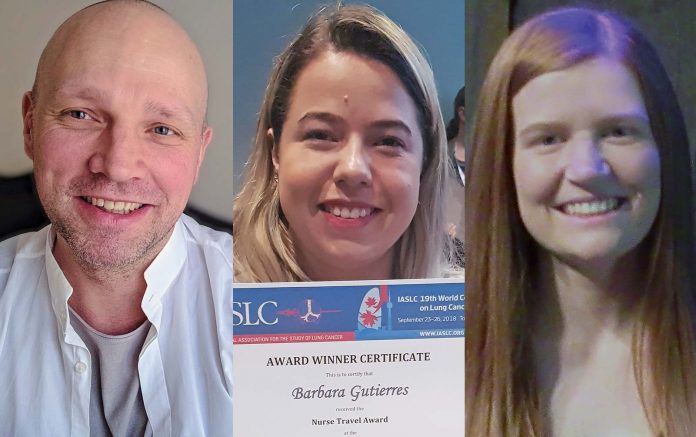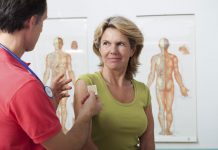By Erik MacLaren, PhD
Posted: April 1, 2019
In September 2018, several attendees of the 19th World Conference on Lung Cancer (WCLC) in Toronto, Canada, received Travel and Mentorship Awards from the Nursing and Allied Health Professionals (AHP) Committee of the IASLC. Nurses and AHPs comprise approximately 5% of IASLC membership according to Pippa Labuc, the chair of the Committee and a senior occupational therapist from Guy’s Hospital in London, UK. “The purpose of these awards is to show that IASLC supports not only doctors, but also nurses and AHP, and that there is a role for these professionals in the society and in the management of patients with lung cancer,” she told the IASLC Lung Cancer News. “We want to encourage more applications from the next generation of nurses and AHP, especially those early in their careers or from low-income countries.” The IASLC Lung Cancer News spoke with the winners about the effects the IASLC award has had on their careers, as well as on their countries.
Travel Award for AHP
The Travel Award for AHP was given to Dégi L. Csaba, PhD, MSW, who is a trained social worker, medical psychologist, and associate professor at Babes-Bolyai University, in Cluj-Napoca, Romania.
Q: How has the Travel Award supported your work?
A: This was the third time I attended the WCLC, and this conference always provides very important opportunities for continuing education and networking with social workers, psychologists, nurses, and other allied health professionals who are all part of this multidisciplinary field. Not only is the latest medical information presented at the WCLC, but there is also a lot of focus on patient advocacy issues such as awareness, prevention, detection, screening, diagnosis, and therapies. This is the only conference and professional society I know that cares so strongly about advocacy for patients with lung cancer.
Q: What is the general state of thoracic oncology in Romania, and how do you think involvement in the IASLC will help improve it?
A: It is very important to be part of this global organization because it provides tools to use in our work in Romania. I am an introvert, and it can be difficult to go out to speak to politicians and try to influence policies. The WCLC helps those of us in the field to speak up and be stronger advocates for needed changes, not just on the level of individual patients with cancer, but also on big-picture items, which we need to get right in order to be effective on the individual level. For example, we have been successful in raising awareness regarding distress in patients with cancer in Romania, but we do not yet have the necessary resources to address it. At the moment, there are fewer than 20 clinical psychologists in the Romanian public health sector, whereas there are 100,000 new patients with cancer every year. We have not yet gotten the big picture right.
Nursing Travel Award
The winner of the Nursing and Allied Health Travel Award was Bárbara De Souza Gutierres Aguilar, MS, a nursing professor from the Universidade Paulista, in São Paulo, Brazil.
Q: How has the Nursing Travel Award supported your work?
A: In Brazil, researchers have no support to attend conferences, so the Travel Award made it possible for me to attend my first WCLC last year, where I had the opportunity to meet and network with health professionals from all over the world. It was great to exchange experiences and research skills with my foreign colleagues, and I am hopeful that these contacts will result in collaborative studies in the future.
Q: What is the general state of thoracic oncology in Brazil, and how do you think involvement in IASLC will help improve it?
A: In Brazil, immunotherapy and nextgeneration sequencing for lung cancer are approved by regulatory agencies; however, they are too expensive for most private health insurance companies and are not available in the public health system. The study that I presented at WCLC 2018 showed that more than 70% of trials sponsored by the pharmaceutical industry assessed innovative drugs, but only 20% assessed a biomarker.1 I believe the IASLC can help to improve patient access to immunotherapy worldwide by encouraging the development of reliable biomarkers, perhaps by creating a taskforce for the issue.
Allied Health Professional Mentorship Award
Another first-time attendee, Brooklyn Mazure, MRT (T), a radiation therapist from the Cross Cancer Institute, in Edmonton, Canada, won this past year’s Allied Health Professional Mentorship Award.
Q: How has the Allied Health Professional Mentorship Award supported your work?
A: This mentorship award provided me with an amazing opportunity to spend a week in the radiation therapy department at the Princess Margaret Hospital, in Toronto, Canada. It was a great opportunity to see varying radiation techniques for patients with lung cancer and to observe the practices and procedures of a department across the country, as well as to bring some of those ideas back to my department. The WCLC allowed me to gain a better grasp on the big picture surrounding patients with thoracic cancer, and I have now become mindful about how we can provide the patient with the best quality of life possible as a team.
Q: What is the general state of thoracic oncology in Canada, and how do you think involvement in IASLC will help improve it?
A: In Canada, the state of thoracic oncology has improved through numerous research initiatives nationally, but like many other countries across the world, patient survival remains staggeringly low. The IASLC funds research to improve outcomes in these patients, and at the WCLC, I saw amazing research that has helped find new drug and immunotherapy combinations to improve the survival of these patients. ✦
Reference:
1. Gutierres B, Dourado B, Alves A, et al. What is the cost of a strong evidence for the treatment of advanced non-small cell lung cancer? J Thorac Oncol. 2018;13:S327.











